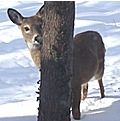- By Dan Veaner
- News
 Print
Print  While the Village of Lansing's deer population management program has anecdotally shown some positive results, Village officials are planning to step up their program to further cull the destructive population in their community. At their December meeting program coordinator Dr. Bernd Blossey asked the Board of Trustees to extend the program to a two month nuisance season through February and March.
While the Village of Lansing's deer population management program has anecdotally shown some positive results, Village officials are planning to step up their program to further cull the destructive population in their community. At their December meeting program coordinator Dr. Bernd Blossey asked the Board of Trustees to extend the program to a two month nuisance season through February and March.A nuisance season has different rules from normal hunting and the Village's deer population management season to date. The NYS Department of Environmental Conservation (DEC) allows shooting until 11pm using artificial lighting and bait to draw the deer to designated locations. Blossey said the maximum hunting in any location would be two visits per week, to prevent a location from being over-used, alerting deer to avoid such an area. He also suggested ways to trick deer into a sense of security around program deer stands, including ribbons that would blow in the wind, and dummies so deer get used to unthreatening movement and the shape of humans in those locations.
"That allows the deer to not get used to the presence of individuals," he said. "When individuals are doing that will be determined by the individuals themselves. We will try to place dummies into those stands, because one of the things deer recognize is when all of a sudden there is danger in the tree."
Additionally, Blossey asked the Trustees to set aside some funding for bait and automatic feeders. He said the expense would be minimal, noting that a ton of corn can be obtained for $120 per ton, and that automated feeders will cost between $50 and $100.
"We have experimented successfully in Trumansburg with automated feeders," Blossey said. "It is a bucket that at any certain time spins and a certain amount of corn comes out. That way participants in the program don't need to come on a daily basis to re-bait. In some locations we don't need a feeder, but we have some locations that are at a further distance and I don't want to impose on individuals to put out bait."
As of December 15th 40 deer had been taken in the Village this year. Last year 49 were taken, and 69 the year before.
"It has been pretty slow," said Trustee Lynn Leopold. "It's clear that we are making inroads in the population. They are getting harder to get, and taking more time to get."
Participant hunters will be selected from among those already vetted to hunt in the Village's Deer Management Focus Area Season.
"We have taken the people who have had hunting experience, put them in the Cornell Nuisance Program," Blossey said. "We trained them so now we can reassign them to the Village of Lansing program."
It will be up to the Village Trustees to decide what happens to the meat. Blossey said a venison donation processer on Peruville Road is currently taking the deer. He said that well over 1,000 pounds of venison have gone to the Southern Tier Food Bank from the Trumansburg program. He noted that would be a good option for the Lansing meat, though some of the meat will go to the hunters and landowners who permitted the hunt to take place on their properties.
"In part I want to reward people who are doing this on a volunteer basis if they have some space in their freezer, or want to give some meat to landowners," he said. "But all the successful hunters have their freezers filled."
Village Attorney David Dubow said that current Village law prohibits some of the conditions of a nuisance hunt. He said in order to move forward with the program the law must be changed, but that timing is going to be a problem unless the Board has a special meeting in January.
"We've got several provisions in our regulations that would be inconsistant with the nuisance procedures," Dubow said. "The most important one is 'the discharge of such bows may occur only during daylight hours of the legal hunting season as designated each year by the DEC, and such times as might be designated by the Trustees, whichever is more restrictive.' It would be outside the hunting season. We can change these provisions. The problem is that it has to be done by local law."
Changing the law requires a time period that includes a specific notification period before a public hearing is held. Dubow said a modified law could be prepared quickly and presented to the Board at its first January meeting, but a special meeting would have to be scheduled for a public hearing.
Blossey said that the most effective hunting times are the first two or three hunting sessions, and said there is no stress on the board to enact a law immediately by February 1st. But board members discussed dates for a special meeting at which to hold a hearing.
v10i48



